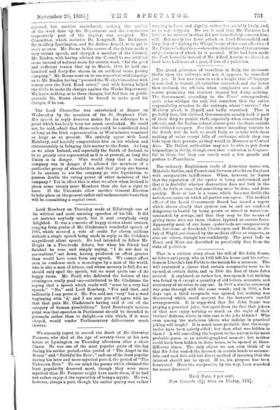Lord Rosebery on Thursday made at Edinburgh one of the
wittiest and most amusing speeches of his life. It did iot instruct anybody much, but it sent everybody away delighted. It was a concrete of happy stories about orators, ranging from praise of Mr. Gladstone's wonderful speech of 1885, which secured a vote of credit for eleven millions without a single speech being made in reply, to Mr. Cobden's magnificent silent speech. He had intended to follow Mr. Bright in a Free-trade debate, but when his friend had finished he rose, and simply saying, "I do not deal in perorations," sat down, having produced an effect greater than would have come from any speech. We cannot affect even to condense such a monologue by a man of the world, who is also a man of letters, and whose memory is full, for we should only spoil the speech, but we must quote one of its happy turns. Mr. Paull, who delivered the lecture of the evening—a really good one—attributed to Mr. Gladstone the saying that a speech which reads well "must be a very bad speech." "No," said Lord Rosebery, "Fox said that, and indirectly I can prove it. Mr. Fox said not 'very' but a word beginning with d,' and I am sure you will agree with me that that puts Mr. Gladstone's having said it out of the category of human possibilities." Lord R,osebery's serious point was that speeches in Parliament should be intended to persuade rather than to delight,—a rule which, if it were obeyed, would render Parliamentary deliverances much shorter.










































 Previous page
Previous page